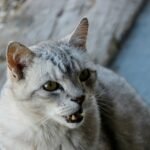An alert from concerned neighbors has led to the discovery and rescue of two protected wild cats being illegally kept as pets in northern Spain. The unusual case began when residents of Santiurde de Toranzo in Cantabria noticed a local individual walking what appeared to be exotic felines that resembled lynx. These suspicious sightings prompted a call to SEPRONA, the specialized environmental protection unit of Spain’s Guardia Civil.
Protected Wild Cat Species Illegally Kept as Exotic Pets
Image by pexels
The two confiscated animals belong to the species Caracal caracal, a medium-sized wild cat that is often mistakenly called a Desert Lynx despite not being a true lynx. These striking felines are naturally found across Africa and parts of the Middle East, making them completely foreign to Spain’s ecosystem.
What makes this case particularly serious is the protected status of these wild cats. The Caracal is listed under the Convention on International Trade in Endangered Species of Wild Fauna and Flora (CITES), an international agreement designed to ensure that trade in wild animals does not threaten their survival. This protected status means that specific documentation is required for any legal ownership, including CITES import permits or certificates proving the animals were bred in captivity.
The owner in Cantabria could produce none of these required documents. When questioned by SEPRONA officers, they admitted to purchasing the wild cats from a couple in Toledo, but without any legitimate invoice or supporting documentation concerning the animals’ origin or “pedigree.”
Further investigation revealed that the wild cats were being kept in woefully inadequate conditions. Rather than the spacious, enriched environments these active predators require, the Caracals were confined to small outdoor cages that failed to meet their basic needs for movement, stimulation, and natural behaviors.
This case reflects a troubling trend of exotic wild cats being sought as status symbols or unusual pets, despite their unsuitability for domestic life and the legal protections in place to prevent such ownership.
Investigation Uncovers Wildlife Trafficking Network
Image by pexels
Following the discovery of the illegally kept Caracals, SEPRONA officers expanded their investigation to trace the origin of the protected animals. This led them to a couple in Toledo who had sold the wild cats to the Cantabria resident without providing any legal documentation.
All three individuals now face serious charges related to wildlife trafficking. The offenses include purchasing or trafficking members of an endangered species, as well as smuggling protected wildlife across borders without proper authorization. The case has been referred to Spain’s Ministry for Ecological Transition and Demographic Challenge for further action.
These charges reflect the gravity with which Spanish authorities view wildlife trafficking. Under Spanish law, penalties for such offenses can include substantial fines and even imprisonment, particularly when the animals involved are protected under international conventions like CITES.
The investigation highlights the often hidden nature of exotic animal trafficking. From initial smuggling into the European Union to domestic sales between private individuals, these transactions typically occur through informal networks that deliberately skirt legal requirements designed to protect vulnerable species.
Conservation experts note that the demand for exotic pets, including wild cats, continues to fuel illegal wildlife trade worldwide. This trade not only endangers the welfare of individual animals but also potentially threatens wild populations when animals are captured from their natural habitats.
Rescue and Rehabilitation of the Confiscated Wild Cats
Once the illegal ownership was confirmed, authorities immediately confiscated the two Caracals. Recognizing that these wild cats required specialized care beyond what standard animal shelters could provide, SEPRONA arranged for their transfer to a facility within the network of CITES rescue centers.
The APP Primadomus Foundation, an international organization with offices in Spain, the Netherlands, and Germany, was selected to take charge of the animals. This foundation specializes in the rescue and rehabilitation of wild animals, particularly those that have been kept in inappropriate captive conditions.
A specialist team from the foundation traveled to Cantabria to safely transport the wild cats to their reception center in Alicante Province. This facility provides appropriate habitats designed to meet the natural needs of wild cats and other exotic species, offering significantly improved living conditions compared to the small cages where they were previously kept.




